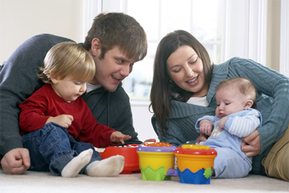
Since before Freud, therapists have stressed the important of early childhood experiences on the psyche and development. With advances in neuroscience and ongoing research, we are learning more about the extent of the impact of early childhood experiences. This is taken from Medical News Today.
From http://www.medicalnewstoday.com/releases/287204.php
Do the effects of early caregiving experiences remain or fade as individuals develop? A new study has found that sensitive caregiving in the first three years of life predicts an individual's social competence and academic achievement, not only during childhood and adolescence, but also into adulthood.
The study, by researchers at the University of Minnesota, the University of Delaware, and the University of Illinois at Urbana-Champaign, appears in the journal Child Development. It was carried out in an effort to replicate and expand on findings from the NICHD Study of Early Child Care and Youth Development, which showed that early maternal sensitivity has lasting associations with children's social and cognitive development at least through adolescence.
"The study indicates that the quality of children's early caregiving experiences has an enduring and ongoing role in promoting successful social and academic development into the years of maturity," notes Lee Raby, postdoctoral researcher at the University of Delaware, who led the study.
Sensitive caregiving is defined as the extent to which a parent responds to a child's signals appropriately and promptly, is positively involved during interactions with the child, and provides a secure base for the child's exploration of the environment.
The researchers used information from 243 individuals who were born into poverty, came from a range of racial/ethnic backgrounds, and had been followed from birth into adulthood (age 32) as part of the Minnesota Longitudinal Study of Risk and Adaptation. Observations of interactions between mothers and their children were collected four times during the children's first three years of life. At multiple ages during childhood and adolescence, teachers reported on children's functioning in their peer groups and children completed standardized tests of academic achievement. During their 20s and early 30s, participants completed interviews in which they discussed their experiences with romantic relationships and reported their educational attainment.
Individuals who experienced more sensitive caregiving early in life consistently functioned better socially and academically during the first three decades of life, the study found. The associations were larger for individuals' academic outcomes than for their functioning in peer and romantic relationships. Moreover, early caregiving experiences continued to predict individuals' academic, but not social, functioning after accounting for early socioeconomic factors as well as children's gender and ethnicity. Although families' economic resources were important predictors of children's development, these variables didn't fully account for the persistent and long-term influence of early caregiving experiences on individuals' academic success.
"Altogether, the study suggests that children's experiences with parents during the first few years of life have a unique role in promoting social and academic functioning--not merely during the first two decades of life, but also during adulthood," according to Raby. "This suggests that investments in early parent-child relationships may result in long-term returns that accumulate across individuals' lives. Because individuals' success in relationships and academics represents the foundation for a healthy society, programs and initiatives that equip parents to interact with their children in a sensitive manner during the first few years of their children's life can have long-term benefits for individuals, families, and society at large."

 RSS Feed
RSS Feed